Charles E W Bean, Diaries, AWM38 3DRL 606/245/1 - 1915 - 1925 - Part 8
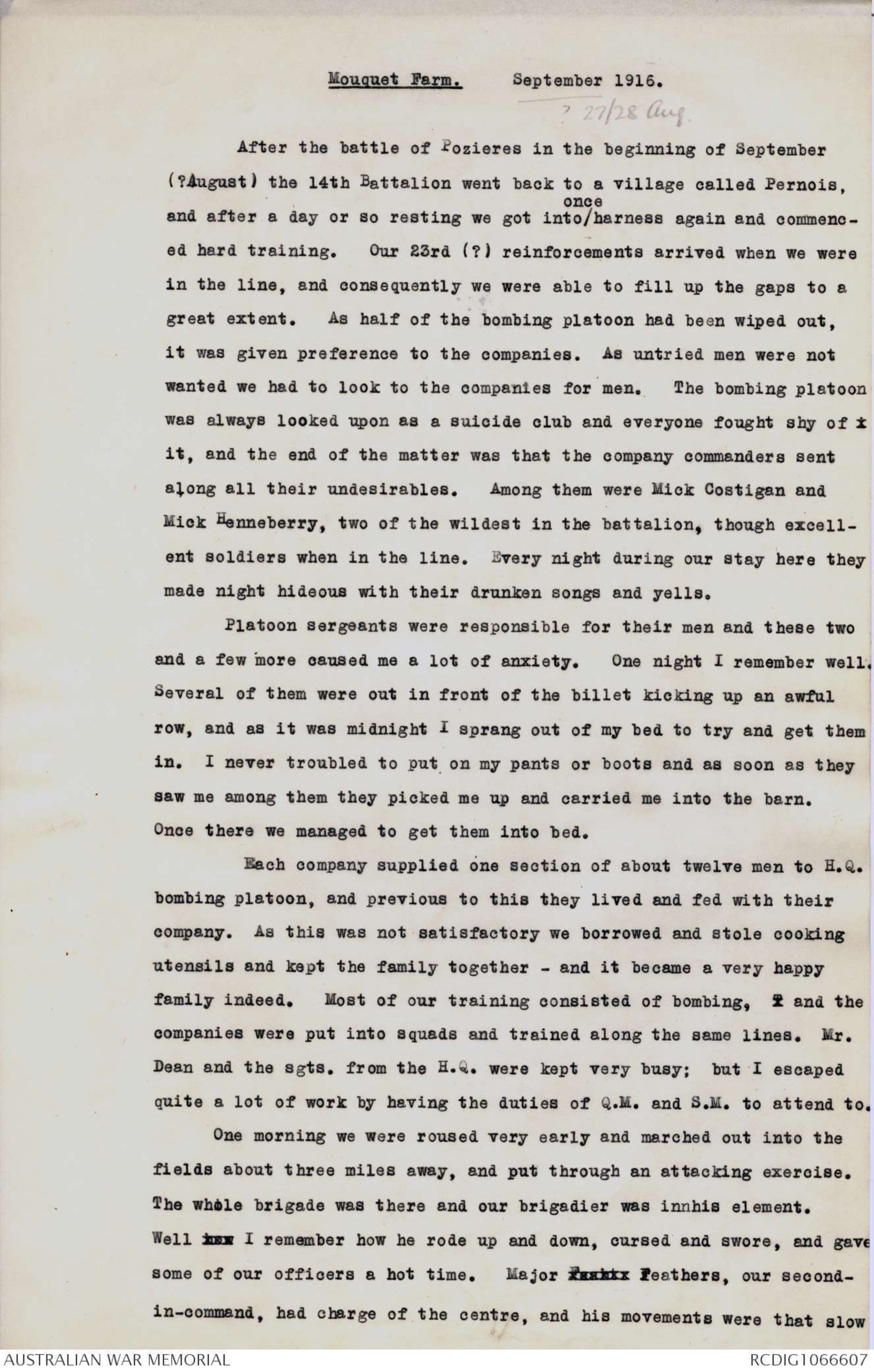
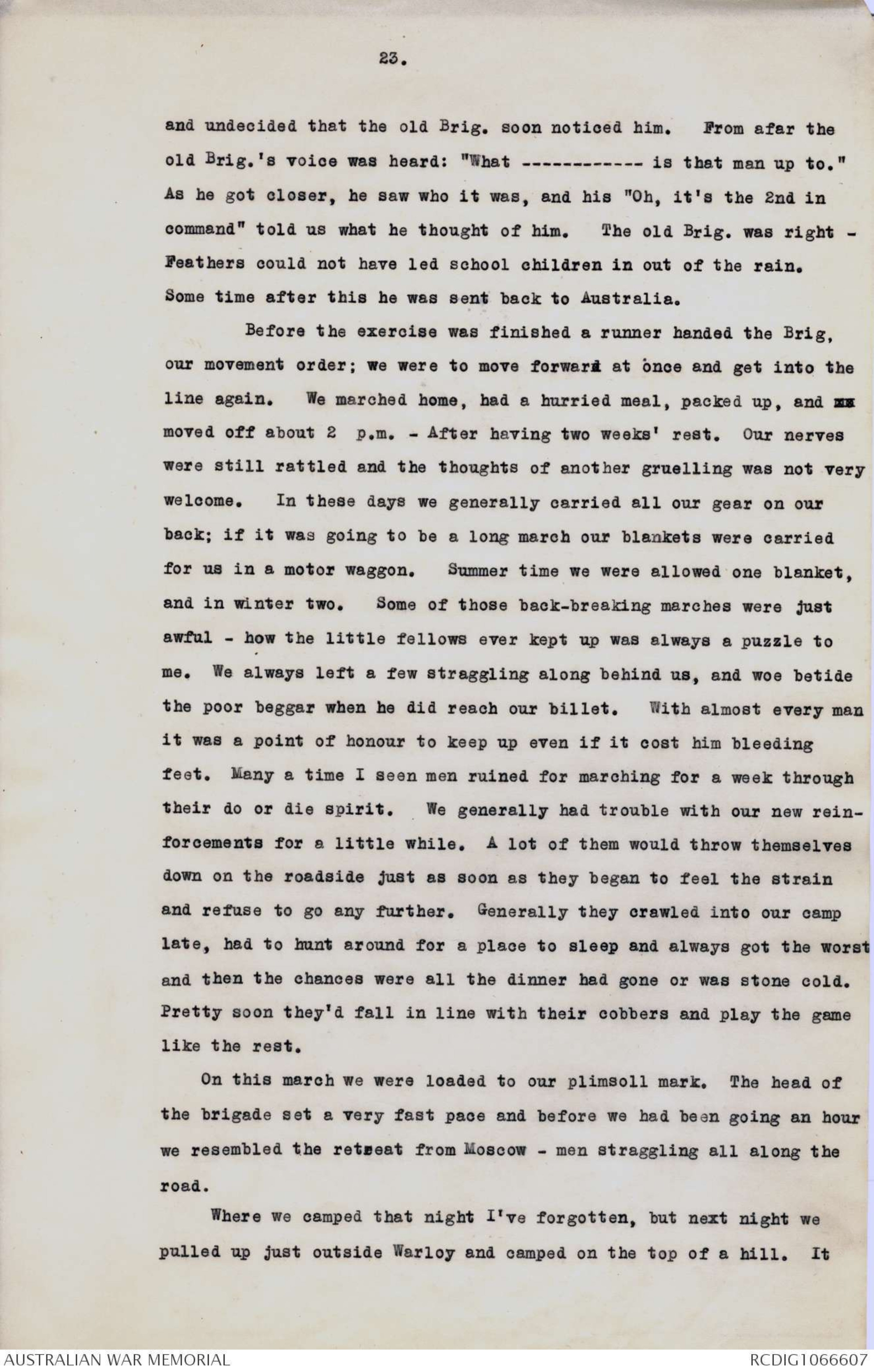
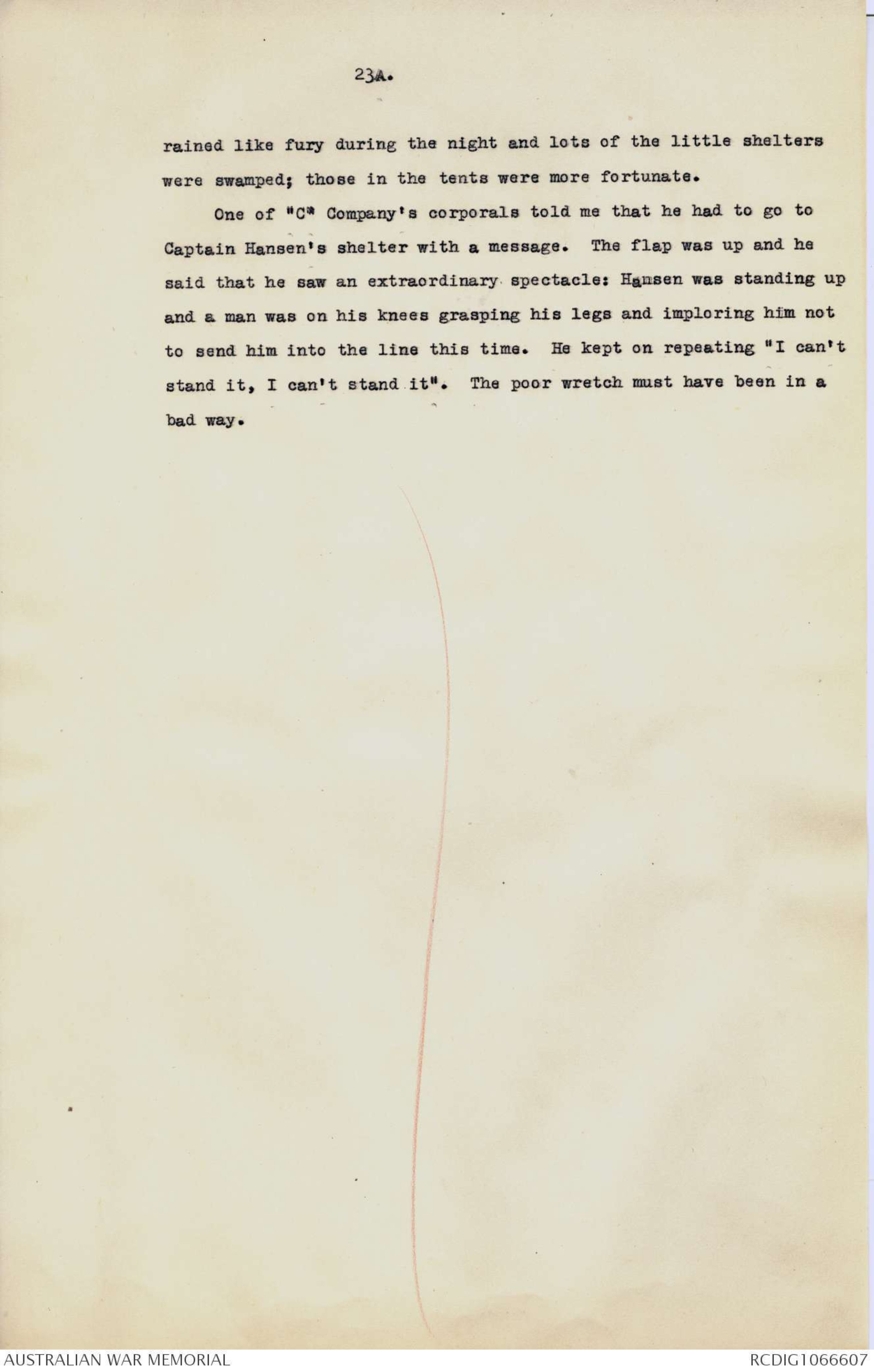
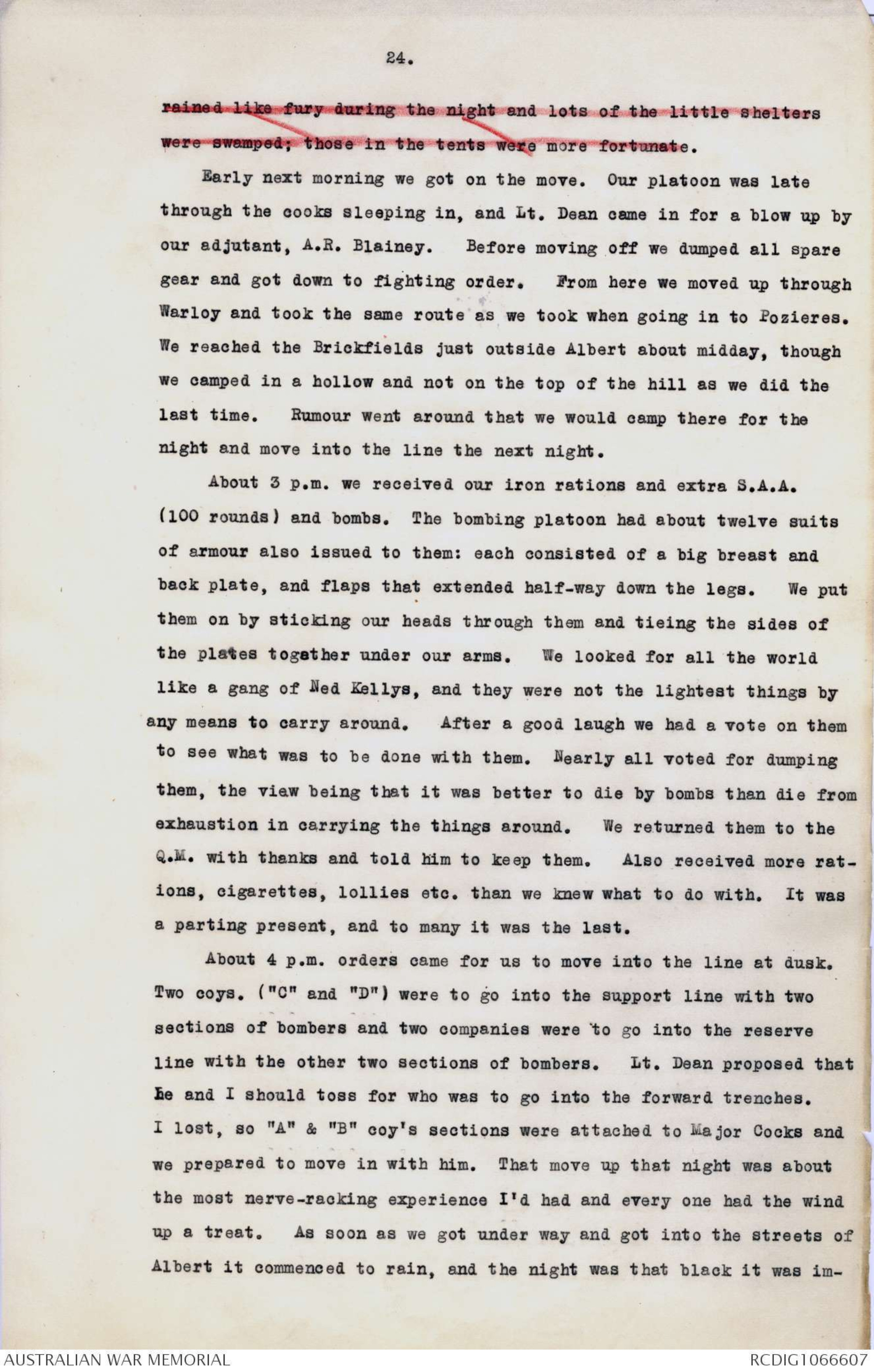
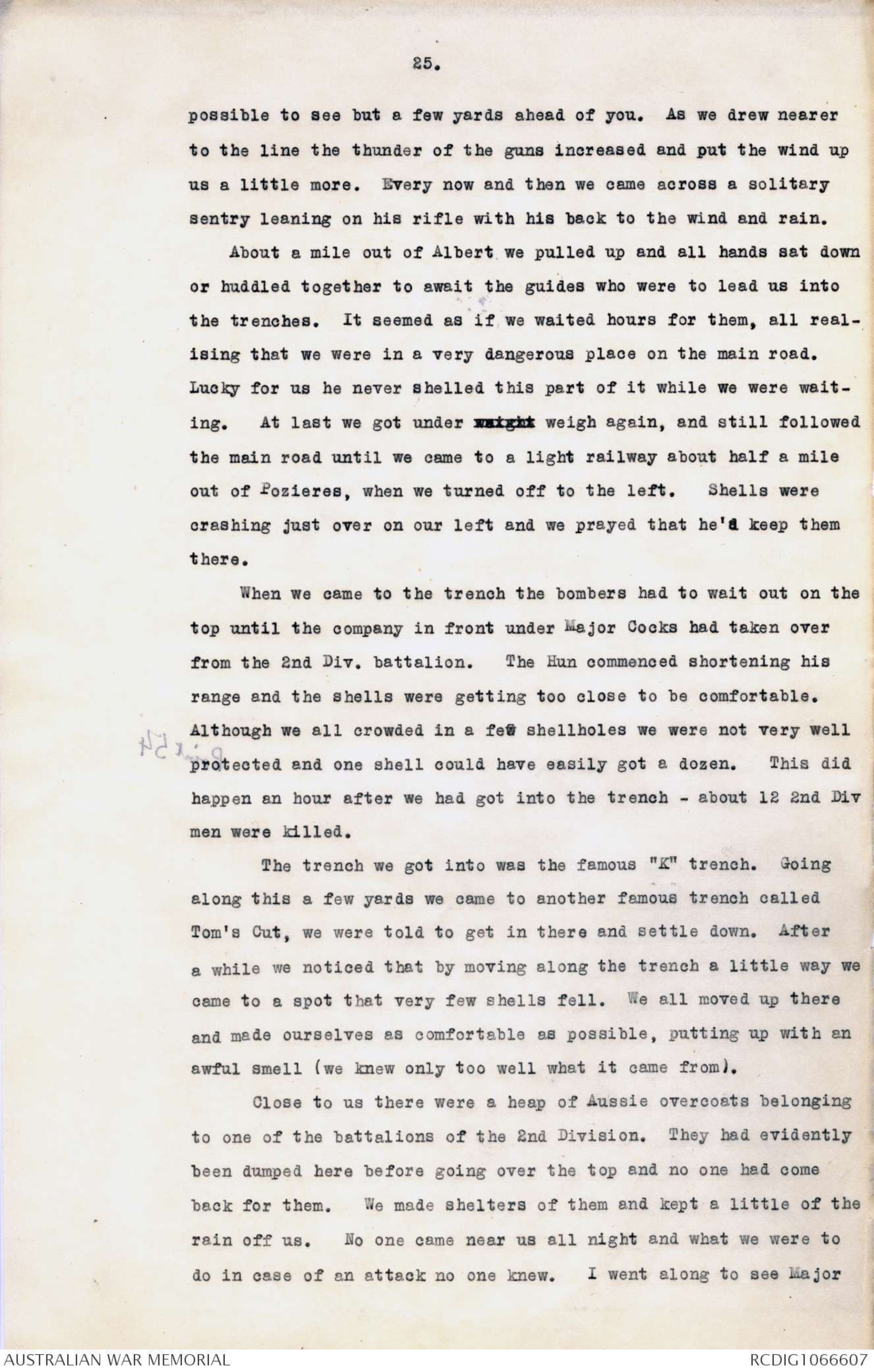
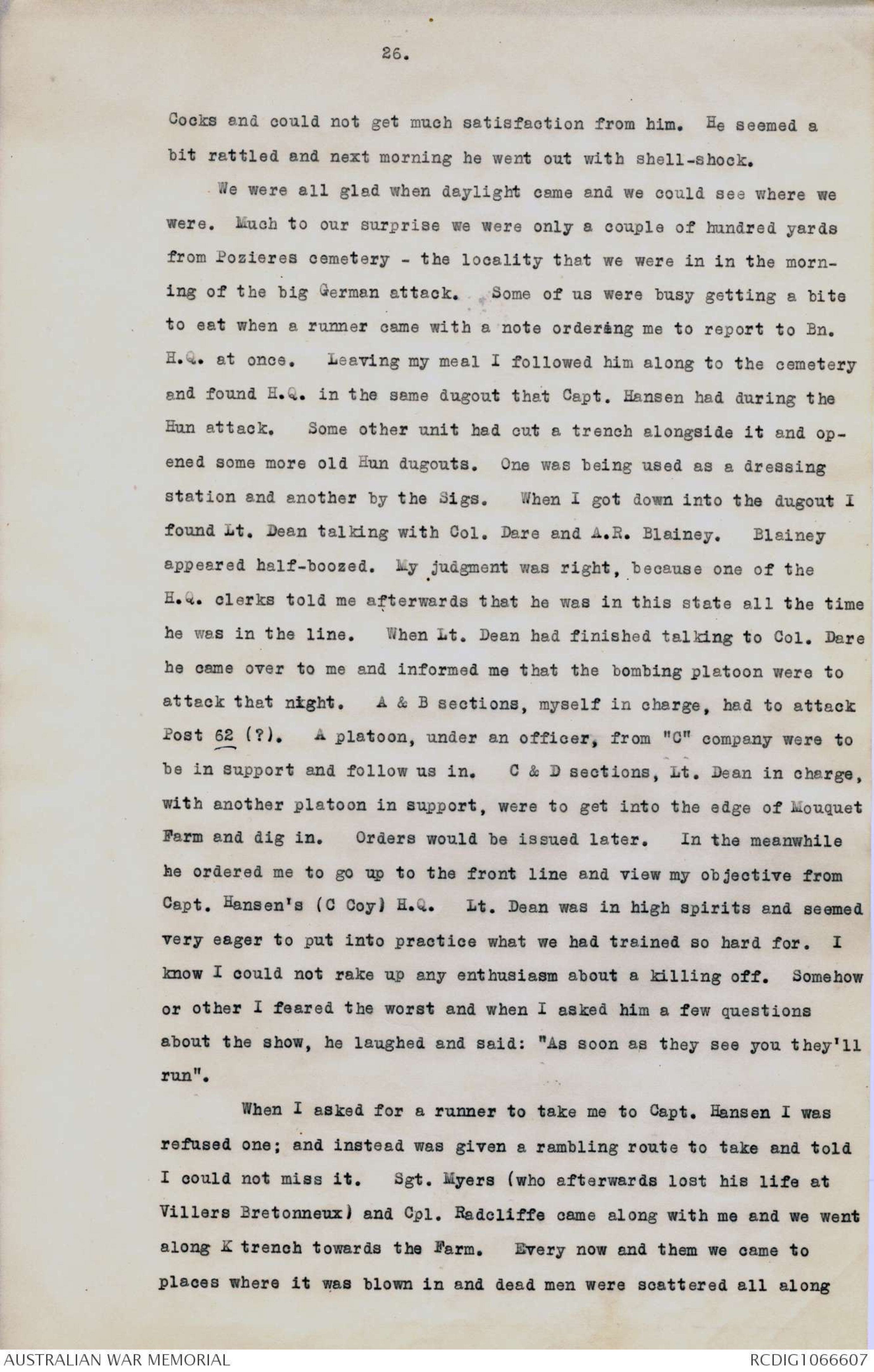
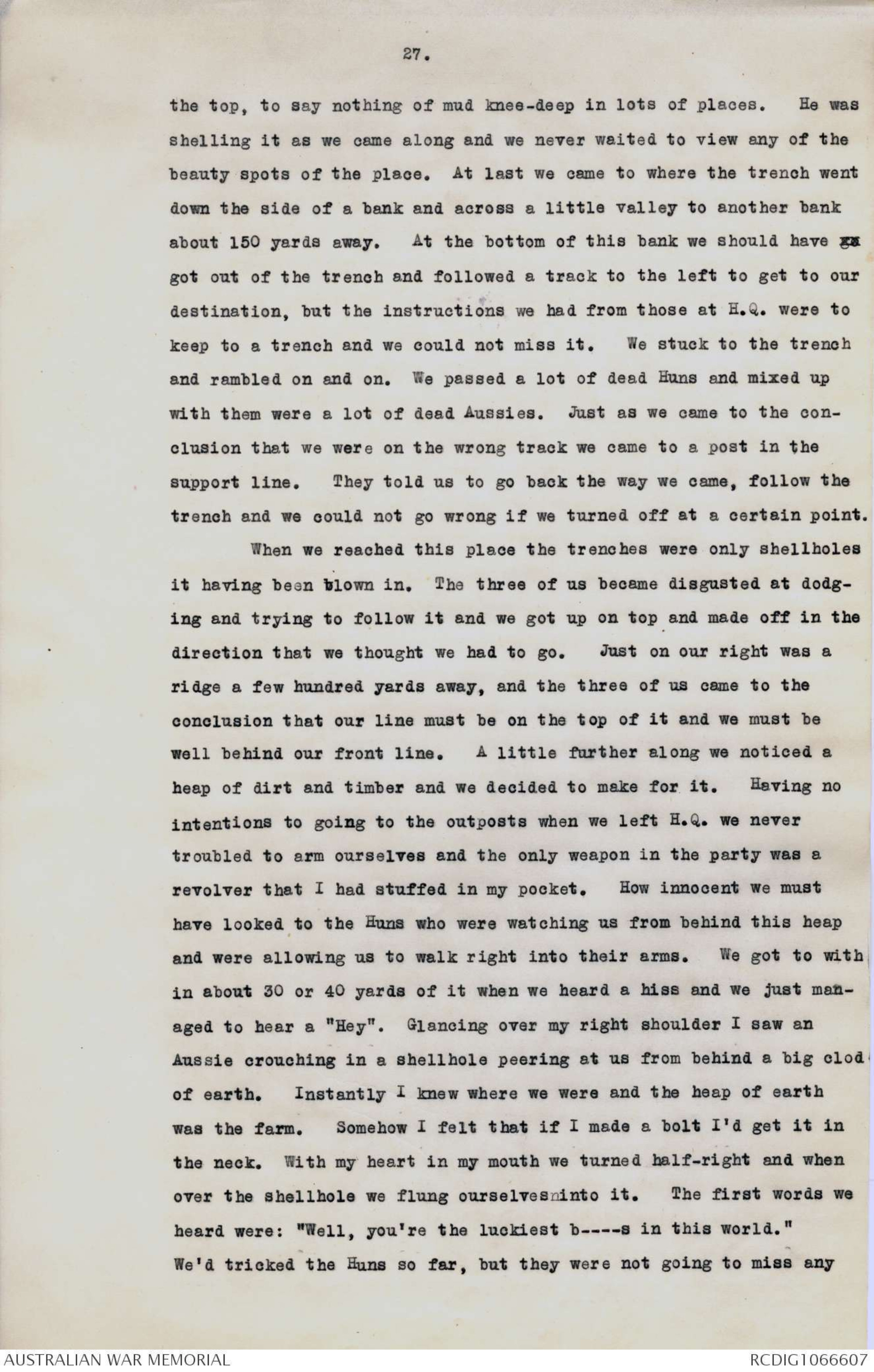
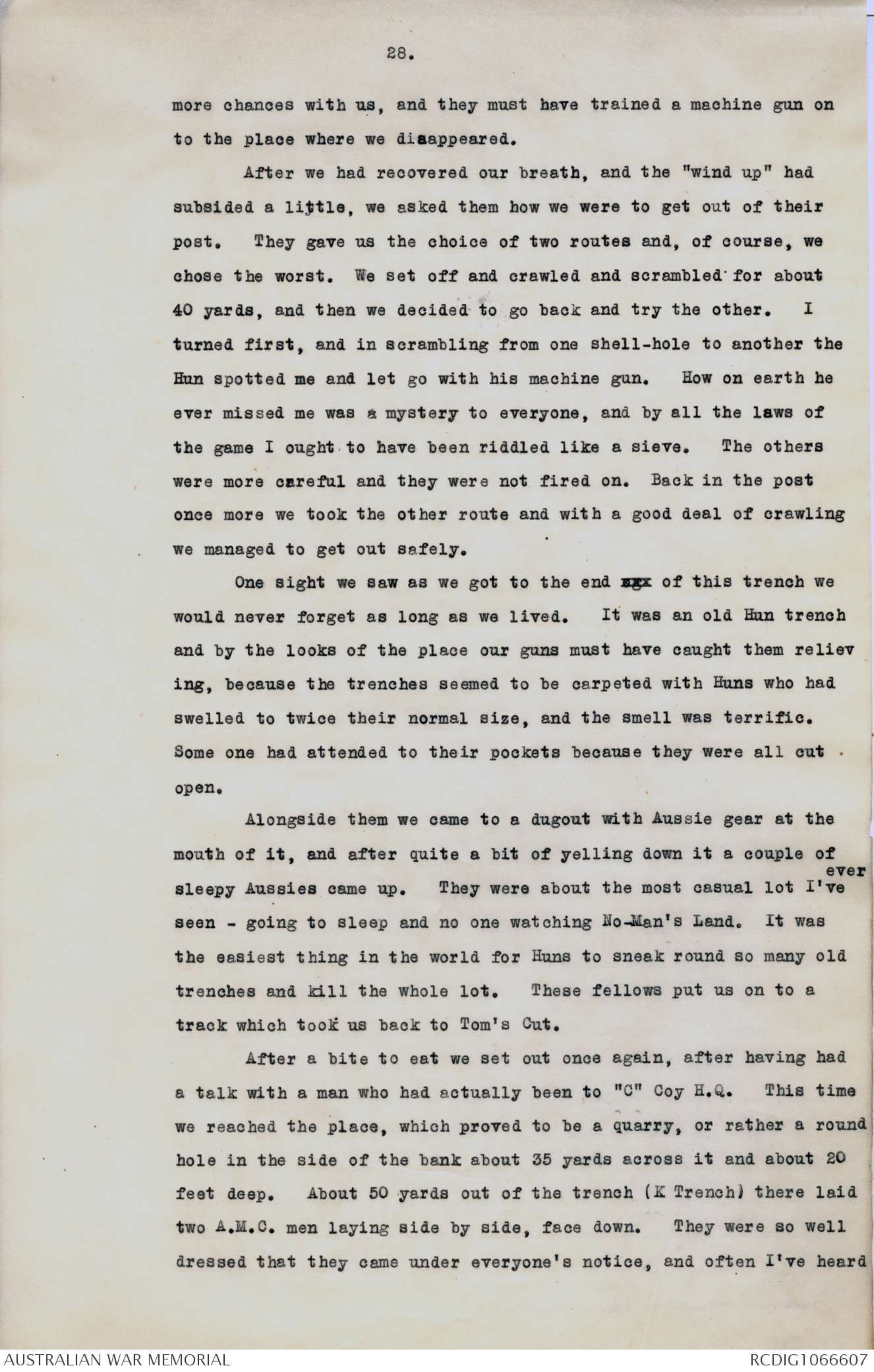
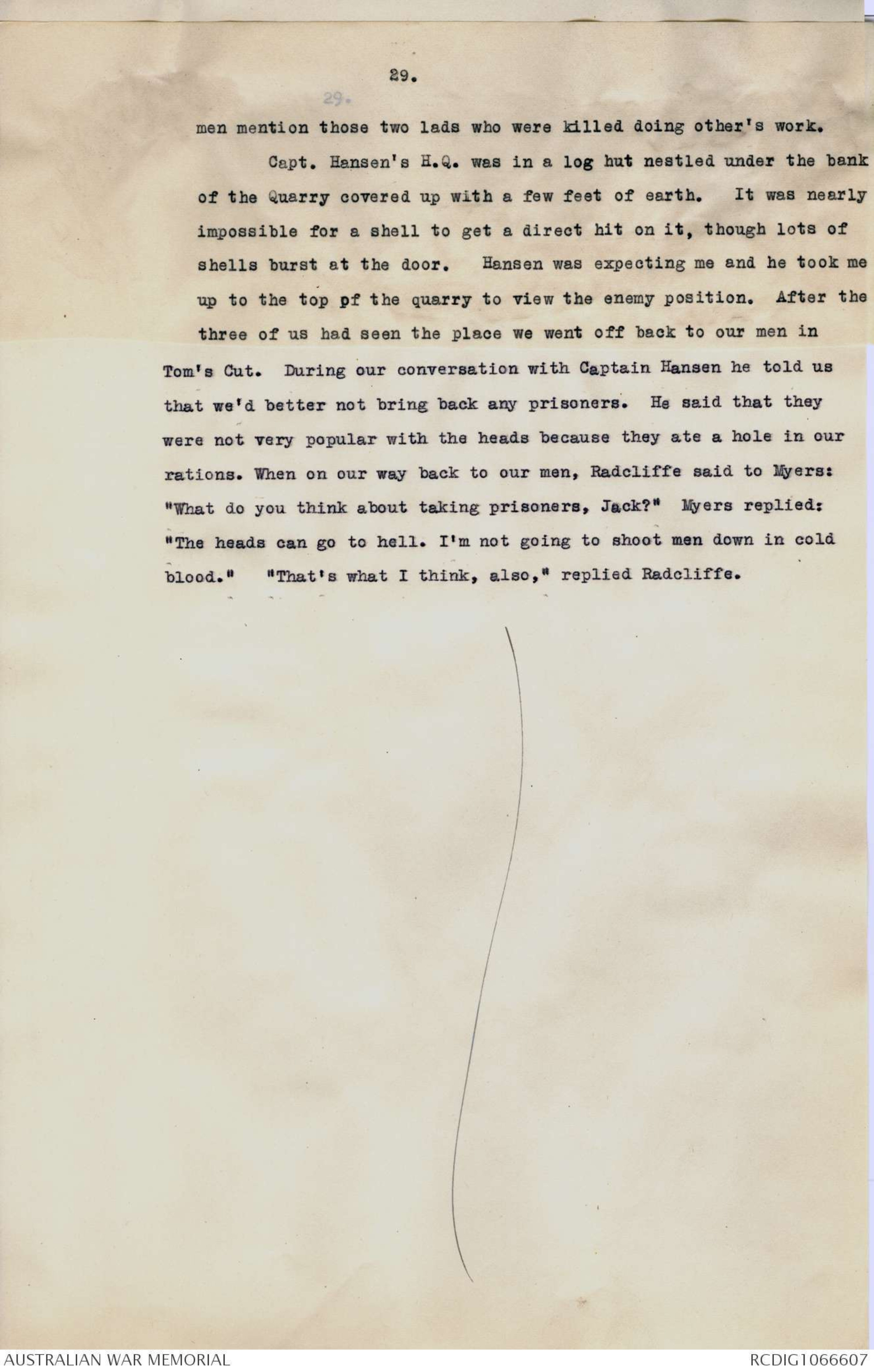
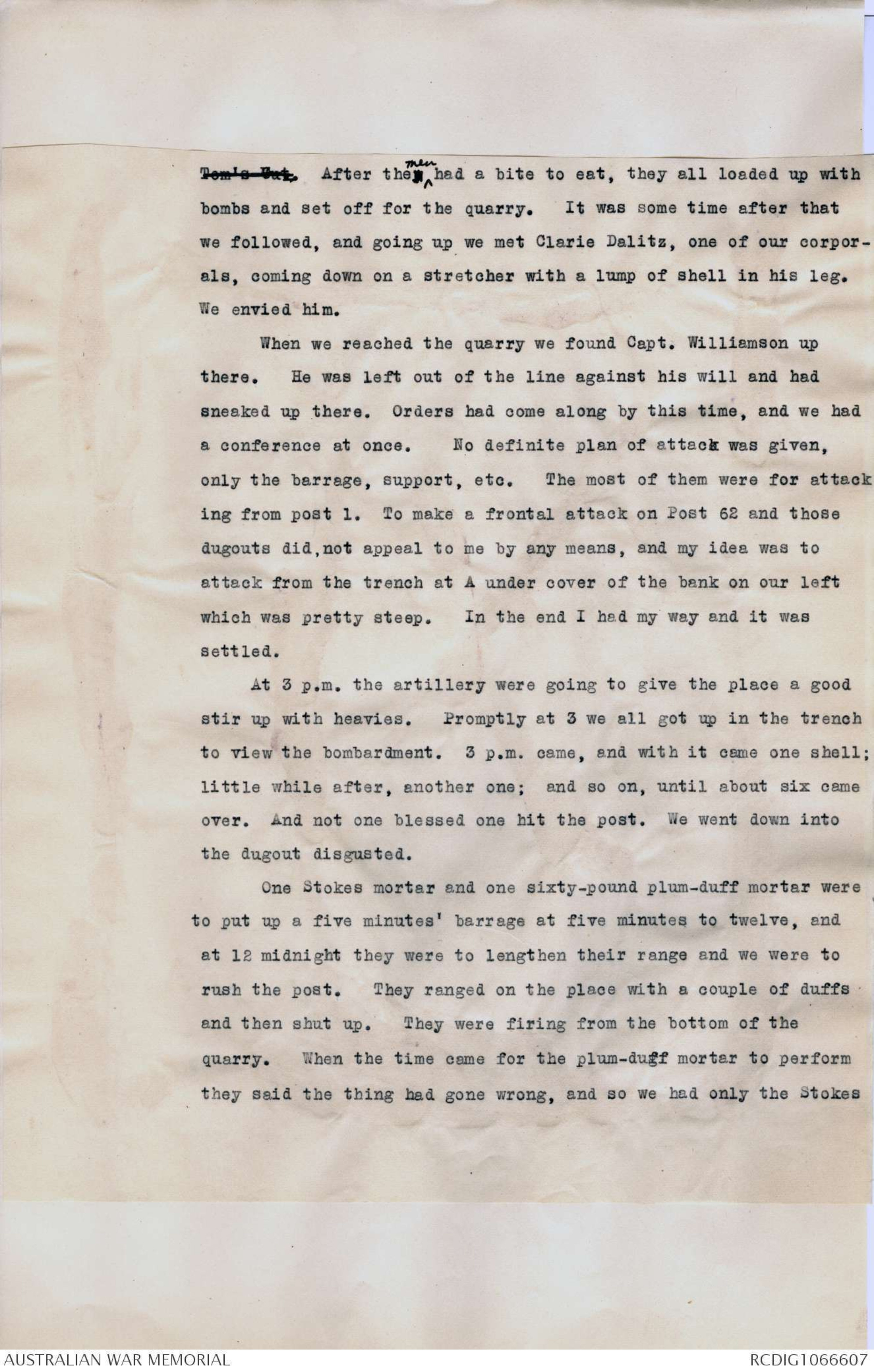
Mouquet Farm.
September 1916.
?27/28 Aug
After the battle of Pozieres in the beginning of September
(?August) the 14th Battalion went back to a village called Pernois,
and after a day or so resting we got into ^once harness again and commenced
hard training. Our 23rd (?) reinforcements arrived when we were
in the line, and consequently we were able to fill up the gaps to a
great extent. As half of the bombing platoon had been wiped out,
it was given preference to the companies. As untried men were not
wanted we had to look to the companies for men. The bombing platoon
was always looked upon as a suicide club and everyone fought shy of i
it, and the end of the matter was that the company commanders sent
along all their undesirables. Among them were Mick Costigan and
Mick Henneberry, two of the wildest in the battalion, though excellent
soldiers when in the line. Every night during our stay here they
made night hideous with their drunken songs and yells.
Platoon sergeants were responsible for their men and these two
and a few more caused me a lot of anxiety. One night I remember well.
Several of them were out in front of the billet kicking up an awful
row, and as it was midnight I sprang out of my bed to try and get them
in. I never troubled to put on my pants or boots and as soon as they
saw me among them they picked me up and carried me into the barn.
Once there we managed to get them into bed.
Each company supplied one section of about twelve men to H.Q.
bombing platoon, and previous to this they lived and fed with their
company. As this was not satisfactory we borrowed and stole cooking
utensils and kept the family together - and it became a very happy
family indeed. Most of our training consisted of bombing, T and the
companies were put into squads and trained along the same lines. Mr.
Dean and the sgts. from the H.Q. were kept very busy; but I escaped
quite a lot of work by having the duties of Q.M. and S.M. to attend to.
One morning we were roused very early and marched out into the
fields about three miles away, and put through an attacking exercise.
The whole brigade was there and our brigadier was innhis element.
Well xxx I remember how he rode up and down, cursed and swore, and gave
some of our officers a hot time. Major xxxxxx Feathers, our second-in-command,
had charge of the centre, and his movements were that slow
23.
and undecided that the old Brig. soon noticed him. From afar the
old Brig.'s voice was heard: "What ----------- is that man up to."
As he got closer, he saw who it was, and his "Oh, it's the 2nd in
command" told us what he thought of him. The old Brig, was right -
Feathers could not have led school children in out of the rain.
Some time after this he was sent back to Australia.
Before the exercise was finished a runner handed the Brig,
our movement order; we were to move forward at once and get into the
line again. We marched home, had a hurried meal, packed up, and xx
moved off about 2 p.m. - After having two weeks' rest. Our nerves
were still rattled and the thoughts of another gruelling was not very
welcome. In these days we generally carried all our gear on our
back; if it was going to be a long march our blankets were carried
for us in a motor waggon. Summer time we were allowed one blanket
and in winter two. Some of those back-breaking marches were just
awful - how the little fellows ever kept up was always a puzzle to
me. We always left a few straggling along behind us, and woe betide
the poor beggar when he did reach our billet. With almost every man
it was a point of honour to keep up even if it cost him bleeding
feet. Many a time I seen men ruined for marching for a week through
their do or die spirit. We generally had trouble with our new reinforcements
for a little while. A lot of them would throw themselves
down on the roadside just as soon as they began to feel the strain
and refuse to go any further. Generally they crawled into our camp
late, had to hunt around for a place to sleep and always got the worst
and then the chances were all the dinner had gone or was stone cold.
Pretty soon they'd fall in line with their cobbers and play the game
like the rest.
On this march we were loaded to our plimsoll mark. The head of
the brigade set a very fast pace and before we had been going an hour
we resembled the retreat from Moscow - men straggling all along the
road.
Where we camped that night I've forgotten, but next night we
pulled up just outside Warloy and camped on the top of a hill. It
23A.
rained like fury during the night and lots of the little shelters
were swamped; those in the tents were more fortunate.
One of "C" Company's corporals told me that he had to go to
Captain Hansen's shelter with a message. The flap was up and he
said that he saw an extraordinary spectacle: Hansen was standing up
and a man was on his knees grasping his legs and imploring him not
to send him into the line this time. He kept on repeating "I can't
stand it, I can't stand it". The poor wretch must have been in a
bad way.
24.rained like fury during the night and lots of the little shelterswere swamped, those in the tents were more fortunate.
Early next morning we got on the move. Our platoon was late
through the cooks sleeping in, and Lt. Dean came in for a blow up by
our adjutant, A.R. Blainey. Before moving off we dumped all spare
gear and got down to fighting order. From here we moved up through
Warloy and took the same route as we took when going in to Pozieres.
We reached the Brickfields just outside Albert about midday, though
we camped in a hollow and not on the top of the hill as we did the
last time. Rumour went around that we would camp there for the
night and move into the line the next night.
About 3 p.m. we received our iron rations and extra S.A.A.
(100 rounds) and bombs. The bombing platoon had about twelve suits
of armour also issued to them: each consisted of a big breast and
back plate, and flaps that extended half-way down the legs. We put
them on by sticking our heads through them and tieing the sides of
the plates together under our arms. We looked for all the world
like a gang of Ned Kellys, and they were not the lightest things by
any means to carry around. After a good laugh we had a vote on them
to see what was to be done with them. Nearly all voted for dumping
them, the view being that it was better to die by bombs than die from
exhaustion in carrying the things around. We returned them to the
Q.M. with thanks and told him to keep them. Also received more rations,
cigarettes, lollies etc. than we knew what to do with. It was
a parting present, and to many it was the last.
About 4 p.m. orders came for us to move into the line at dusk.
Two coys. ("C" and "D") were to go into the support line with two
sections of bombers and two companies were to go into the reserve
line with the other two sections of bombers. Lt. Dean proposed that
he and I should toss for who was to go into the forward trenches.
I lost, so "A” & "B" coy's sections were attached to Major Cocks and
we prepared to move in with him. That move up that night was about
the most nerve-racking experience I'd had and every one had the wind
up a treat. As soon as we got under way and got into the streets of
Albert it commenced to rain, and the night was that black it was impossible
25.
possible to see but a few yards ahead of you. As we drew nearer
to the line the thunder of the guns increased and put the wind up
us a little more. Every now and then we came across a solitary
sentry leaning on his rifle with his back to the wind and rain.
About a mile out of Albert we pulled up and all hands sat down
or huddled together to await the guides who were to lead us into
the trenches. It seemed as if we waited hours for them, all realising
that we were in a very dangerous place on the main road.
Lucky for us he never shelled this part of it while we were waiting.
At last we got under weight weigh again, and still followed
the main road until we came to a light railway about half a mile
out of Pozieres, when we turned off to the left. Shells were
crashing just over on our left and we prayed that he'd keep them
there.
When we came to the trench the bombers had to wait out on the
top until the company in front under Major Cocks had taken over
from the 2nd Div. battalion. The Hun commenced shortening his
range and the shells were getting too close to be comfortable.
Although we all crowded in a few shellholes we were not very well
protected and one shell could have easily got a dozen. This did
happen an hour after we had got into the trench - about 12 2nd Div
men were killed.
The trench we got into was the famous "K" trench. Going
along this a few yards we came to another famous trench called
Tom's Cut, we were told to get in there and settle down. After
a while we noticed that by moving along the trench a little way we
came to a spot that very few shells fell. We all moved up there
and made ourselves as comfortable as possible, putting up with an
awful smell (we knew only too well what it came from).
Close to us there were a heap of Aussie overcoats belonging
to one of the battalions of the 2nd Division. They had evidently
been dumped here before going over the top and no one had come
back for them. We made shelters of them and kept a little of the
rain off us. No one came near us all night and what we were to
do in case of an attack no one knew. I went along to see Major
26.
Cocks and could not get much satisfaction from him. He seemed a
bit rattled and next morning he went out with shell-shock.
We were all glad when daylight came and we could see where we
were. Much to our surprise we were only a couple of hundred yards
from Pozieres cemetery - the locality that we were in in the morning
of the big German attack. Some of us were busy getting a bite
to eat when a runner came with a note ordering me to report to Bn.
H.Q. at once. Leaving my meal I followed him along to the cemetery
and found H.Q. in the same dugout that Capt. Hansen had during the
Hun attack. Some other unit had cut a trench alongside it and opened
some more old Hun dugouts. One was being used as a dressing
station and another by the Sigs. When I got down into the dugout I
found Lt. Dean talking with Col. Dare and A.R. Blainey. Blainey
appeared half-boozed. My judgment was right, because one of the
H.Q. clerks told me afterwards that he was in this state all the time
he was in the line. When Lt. Dean had finished talking to Col. Dare
he came over to me and informed me that the bombing platoon were to
attack that night. A & B sections, myself in charge, had to attack
Post 62 (?). A platoon, under an officer, from "C" company were to
be in support and follow us in. C & D sections, Lt. Dean in charge,
with another platoon in support, were to get into the edge of Mouquet
Farm and dig in. Orders would be issued later. In the meanwhile
he ordered me to go up to the front line and view my objective from
Capt. Hansen's (C Coy) H.Q. Lt. Dean was in high spirits and seemed
very eager to put into practice what we had trained so hard for. I
know I could not rake up any enthusiasm about a killing off. Somehow
or other I feared the worst and when I asked him a few questions
about the show, he laughed and said: "As soon as they see you they'll
run".
When I asked for a runner to take me to Capt. Hansen I was
refused one; and instead was given a rambling route to take and told
I could not miss it. Sgt. Myers (who afterwards lost his life at
Villers Bretonneux) and Cpl. Radcliffe came along with me and we went
along K trench towards the Farm. Every now and them we came to
places where it was blown in and dead men were scattered all along
27.
the top, to say nothing of mud knee-deep in lots of places. He was
shelling it as we came along and we never waited to view any of the
beauty spots of the place. At last we came to where the trench went
down the side of a bank and across a little valley to another bank
about 150 yards away. At the bottom of this bank we should have xx
got out of the trench and followed a track to the left to get to our
destination, but the instructions we had from those at H.Q. were to
keep to a trench and we could not miss it. We stuck to the trench
and rambled on and on. We passed a lot of dead Huns and mixed up
with them were a lot of dead Aussies. Just as we came to the conclusion
that we were on the wrong track we came to a post in the
support line. They told us to go back the way we came, follow the
trench and we could not go wrong if we turned off at a certain point.
When we reached this place the trenches were only shellholes
it having been blown in. The three of us became disgusted at dodging
and trying to follow it and we got up on top and made off in the
direction that we thought we had to go. Just on our right was a
ridge a few hundred yards away, and the three of us came to the
conclusion that our line must be on the top of it and we must be
well behind our front line. A little further along we noticed a
heap of dirt and timber and we decided to make for it. Having no
intentions to going to the outposts when we left H.Q. we never
troubled to arm ourselves and the only weapon in the party was a
revolver that I had stuffed in my pocket. How innocent we must
have looked to the Huns who were watching us from behind this heap
and were allowing us to walk right into their arms. We got to with
in about 30 or 40 yards of it when we heard a hiss and we just managed
to hear a "Hey". Glancing over my right shoulder I saw an
Aussie crouching in a shellhole peering at us from behind a big clod
of earth. Instantly I knew where we were and the heap of earth
was the farm. Somehow I felt that if I made a bolt I'd get it in
the neck. With my heart in my mouth we turned half-right and when
over the shellhole we flung ourselvesninto it. The first words we
heard were: "Well, you're the luckiest b----s in this world."
We'd tricked the Huns so far, but they were not going to miss any
28.
more chances with us, and they must have trained a machine gun on
to the place where we disappeared.
After we had recovered our breath, and the "wind up" had
subsided a little, we asked them how we were to get out of their
post. They gave us the choice of two routes and, of course, we
chose the worst. We set off and crawled and scrambled for about
40 yards, and then we decided to go back and try the other. I
turned first, and in scrambling from one shell-hole to another the
Hun spotted me and let go with his machine gun. How on earth he
ever missed me was a mystery to everyone, and by all the laws of
the game I ought to have been riddled like a sieve. The others
were more careful and they were not fired on. Back in the post
once more we took the other route and with a good deal of crawling
we managed to get out safely.
One sight we saw as we got to the end xxx of this trench we
would never forget as long as we lived. It was an old Hun trench
and by the looks of the place our guns must have caught them relieving,
because the trenches seemed to be carpeted with Huns who had
swelled to twice their normal size, and the smell was terrific.
Some one had attended to their pockets because they were all cut
open.
Alongside them we came to a dugout with Aussie gear at the
mouth of it, and after quite a bit of yelling down it a couple of
sleepy Aussies came up. They were about the most casual lot I've ^ever
seen - going to sleep and no one watching No-Man's Land. It was
the easiest thing in the world for Huns to sneak round so many old
trenches and kill the whole lot. These fellows put us on to a
track which took us back to Tom's Cut.
After a bite to eat we set out once again, after having had
a talk with a man who had actually been to "C" Coy H.Q. This time
we reached the place, which proved to be a quarry, or rather a round
hole in the side of the bank about 35 yards across it and about 20
feet deep. About 50 yards out of the trench (K Trench) there laid
two A.M.C. men laying side by side, face down. They were so well
dressed that they came under everyone's notice, and often I've heard
29.
men mention those two lads who were killed doing other's work.
Capt. Hansen's H.Q. was in a log hut nestled under the bank
of the Quarry covered up with a few feet of earth. It was nearly
impossible for a shell to get a direct hit on it, though lots of
shells burst at the door. Hansen was expecting me and he took me
up to the top of the quarry to view the enemy position. After the
three of us had seen the place we went off back to our men in
Tom's Cut. During our conversation with Captain Hansen he told us
that we'd better not bring back any prisoners. He said that they
were not very popular with the heads because they ate a hole in our
rations. When on our way back to our men, Radcliffe said to Myers:
"What do you think about taking prisoners, Jack?" Myers replied:
"The heads can go to hell. I'm not going to shoot men down in cold
blood." "That's what I think, also," replied Radcliffe.
Tom's Cut. After they ^ men had a bite to eat, they all loaded up with
bombs and set off for the quarry. It was some time after that
we followed, and going up we met Clarie Dalitz, one of our corporals,
coming down on a stretcher with a lump of shell in his leg.
We envied him.
When we reached the quarry we found Capt. Williamson up
there. He was left out of the line against his will and had
sneaked up there. Orders had come along by this time, and we had
a conference at once. No definite plan of attack was given,
only the barrage, support, etc. The most of them were for attacking
from post 1. To make a frontal attack on Post 62 and those
dugouts did,not appeal to me by any means, and my idea was to
attack from the trench at A under cover of the bank on our left
which was pretty steep. In the end I had my way and it was
settled.
At 3 p.m. the artillery were going to give the place a good
stir up with heavies. Promptly at 3 we all got up in the trench
to view the bombardment. 3 p.m. came, and with it came one shell;
little while after, another one; and so on, until about six came
over. And not one blessed one hit the post. We went down into
the dugout disgusted.
One Stokes mortar and one sixty-pound plum-duff mortar were
to put up a five minutes' barrage at five minutes to twelve, and
at 12 midnight they were to lengthen their range and we were to
rush the post. They ranged on the place with a couple of duffs
and then shut up. They were firing from the bottom of the
quarry. When the time came for the plum-duff mortar to perform
they said the thing had gone wrong, and so we had only the Stokes
 Sandy Mudie
Sandy MudieThis transcription item is now locked to you for editing. To release the lock either Save your changes or Cancel.
This lock will be automatically released after 60 minutes of inactivity.